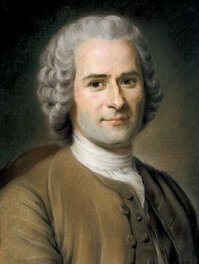Jean-Jacques Rousseau (1712—1778)
Conventional Autobiography
On June 28, 1712, in Geneva, Jean-Jacques Rousseau was born to Isaac Rousseau and Suzanne Bernard. A few days later, on July 7, his mother passed away, and when Rousseau was still a young boy, his sole sibling, an older brother, ran away from home. As a result, Rousseau was primarily raised by his clockmaker father, who introduced him to ancient Greek and Roman works of literature like Plutarch’s Lives at a young age. After a fight with a French captain, his father decided to spend the remainder of his life outside of Geneva rather than face incarceration. Uncle Rousseau took care of Rousseau while he stayed behind and sent him and his cousin to school in the village of Bosey. In Rousseau started his apprenticeship as an engraver in 1725 and started learning the craft. He thought his master was cruel and oppressive, but he did not hate the labor. As a result, he escaped Geneva in 1728 and made his way to Annecy. He met Louise de Warens here, who played a key role in his decision to become a Catholic and renounce his Genevan citizenship. He would later return to Geneva and formally return to Calvinism in 1754. Rousseau and Mme. de Warens had a long-lasting and eventually romantic relationship. He made money throughout this time working as a teacher, a secretary, and a musician.Rousseau moved to Paris in 1742 to pursue a career as a composer and musician. Following two years of holding a position at the French Rousseau moved to Paris in 1742 to pursue a career as a composer and musician. Following two years of holding a position at the French Some saw Rousseau as an outright opponent of development because of his criticism of the arts and sciences in the First Discourse, a viewpoint that was in direct opposition to the Enlightenment movement. At this time in his life, Rousseau continued to place a high value on music. A few years later, he achieved even greater recognition for his opera Le Devin du Village, also known as The Village Soothsayer. However, Rousseau made an effort to lead a modest life in spite of his notoriety, and he quickly stopped writing music after his opera’s popularity.
Rousseau entered another essay competition that the Academy of Dijon announced in the fall of 1753. This time, the query was, “What is the cause of male disparity, and is it In reaction, Rousseau wrote the Discourse on the Origin of Inequality Among Men. To some, his criticism of the arts was justified by natural law. Because the Second Discourse was much lengthier and more adventurous theoretically than the First Discourse, Rousseau himself believed that this work was superior to it. The judges never got around to reading it because of its length and its audacious and unconventional philosophical statements. But like the First Discourse, Rousseau had already made arrangements for it to be published somewhere else, and it was likewise widely read and discussed.
After being invited to a home in the nation by Mme. D’Epinay, a friend of Rousseau’s, the two departed Paris in 1756, one year after the Second Discourse was published. After being invited to a home in the countryside by Mme. D’Epinay, a friend of the philosophes, Rousseau and Therese Levasseur departed Paris. During his brief year-long visit, he had an affair with Sophie d’Houdetot, his friend Saint-Lambert’s mistress. After a string of arguments with Mme. D’Epinay and her other visitors, including Diderot, in 1757, Rousseau relocated to accommodations close to the Duke of Luxemburg’s rural estate at Montmorency.
Rousseau authored some of his most significant works during this period. One of the century’s best-selling books, Julie or the New Heloise, was one of his works published in 1761. Then, in 1762, just a year later, he released two significant philosophical treatises: in The Social Contract, his seminal work on political theory, was published in April, and Emile, a book outlining his ideas on education, was published in May. Rousseau was forced to leave France after the Paris authorities denounced both of these publications, mostly because of statements he made regarding religion. After relocating to Switzerland, he started writing his autobiography, Confessions, in 1764. After running into issues with the Swiss authorities a year later, he traveled to Berlin and Paris before accepting David Hume’s invitation to relocate to England. But his time in England lasted little more than a year because of disagreements with Hume; in 1767, he surreptitiously returned to the southeast of France.
Rousseau returned to Paris in 1770 after three years in the southeast and replicated worked as a music copyist. Rousseau: Judge of Jean-Jacques and the Reveries of the Solitary Walker, which would become his final writings, were written during this period. On July 3, 1778, he passed away. His last political writings were published in the nineteenth century, including his Confessions a few years after his passing.
 Skip to content
Skip to content
